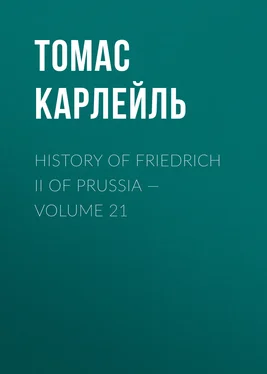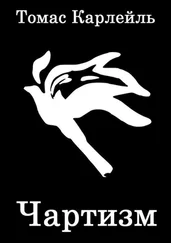Томас Карлейль - History of Friedrich II of Prussia — Volume 21
Здесь есть возможность читать онлайн «Томас Карлейль - History of Friedrich II of Prussia — Volume 21» — ознакомительный отрывок электронной книги совершенно бесплатно, а после прочтения отрывка купить полную версию. В некоторых случаях можно слушать аудио, скачать через торрент в формате fb2 и присутствует краткое содержание. Жанр: foreign_prose, История, literature_19, foreign_edu, foreign_antique, на английском языке. Описание произведения, (предисловие) а так же отзывы посетителей доступны на портале библиотеки ЛибКат.
- Название:History of Friedrich II of Prussia — Volume 21
- Автор:
- Жанр:
- Год:неизвестен
- ISBN:нет данных
- Рейтинг книги:3 / 5. Голосов: 1
-
Избранное:Добавить в избранное
- Отзывы:
-
Ваша оценка:
- 60
- 1
- 2
- 3
- 4
- 5
History of Friedrich II of Prussia — Volume 21: краткое содержание, описание и аннотация
Предлагаем к чтению аннотацию, описание, краткое содержание или предисловие (зависит от того, что написал сам автор книги «History of Friedrich II of Prussia — Volume 21»). Если вы не нашли необходимую информацию о книге — напишите в комментариях, мы постараемся отыскать её.
History of Friedrich II of Prussia — Volume 21 — читать онлайн ознакомительный отрывок
Ниже представлен текст книги, разбитый по страницам. Система сохранения места последней прочитанной страницы, позволяет с удобством читать онлайн бесплатно книгу «History of Friedrich II of Prussia — Volume 21», без необходимости каждый раз заново искать на чём Вы остановились. Поставьте закладку, и сможете в любой момент перейти на страницу, на которой закончили чтение.
Интервал:
Закладка:
August 28th, 1763, while afflicted Polish Majesty is making his packages at Warsaw, far away,—Marie-Antoinette, in Dresden, had sent Friedrich an Opera of her composing, just brought out by her on her Court-theatre there. Here is Friedrich's Answer,—to what kind of OPERA I know not, but to a Letter accompanying it which is extremely pretty.
FRIEDRICH TO THE ELECTORAL PRINCESS (at Dresden).
"POTSDAM, 5th September, 1763.
"MADAM MY SISTER,—The remembrance your Royal Highness sends is the more flattering to me, as I regret infinitely not to have been spectator and hearer of the fine things [Opera THALESTRIS, words and music entirely lost to us] which I have admired for myself in the silent state.
"I wish I could send you things as pleasant out of these parts: but, Madam, I am obliged to give you a hint, which may be useful if you can have it followed. In Saxony, however, my Letters get opened;—which obliges me to send this by a special Messenger; and him, that he may cause no suspicion, I have charged with fruits from my garden. You will have the goodness to say [if anybody is eavesdropping] that you asked them of me at Moritzburg, when I was happy enough to see you there [six months ago, coming home from the Seven-Years War]. The hint I had to give was this:—
"In Petersburg people's minds are getting angry at the stubbornness your friends show in refusing to recognize Duke Bieren [home from Siberia, again Duke of Courland, by Russian appointment, as if Russia had that right; Polish Majesty and his Prince Karl resisting to the uttermost]. I counsel you to induce the powerful in your circle to have this condescension [they have had it, been obliged to have it, though Friedrich does not yet know]; for it will turn out ill to them, if they persist in being obstinately stiff. It begins already to be said That there are more than a million Russian subjects at this time refugees in Poland; whom, by I forget what cartel, the Republic was bound to deliver up. Orders have been given to Detachments of Military to enter certain places, and bring away these Russians by force. In a word, you will ruin your affairs forever, unless you find means to produce a change of conduct on the part of him they complain of. Take, Madam, what I now say as a mark of the esteem and profound regard with which—"—F. [ OEuvres de Frederic, xxiv. 46.]
This hint, if the King knew, had been given, in a less kind shape, by Necessity itself; and had sent Polish Majesty, and his Bruhls and "powerful people," bodily home, and out of that Polish Russian welter, in a headlong and tragically passionate condition. Electoral Princess, next time she writes, is become Electress all at once.
ELECTRESS MARIE-ANTOINE TO FRIEDRICH.
"DRESDEN, 5th October, 1763.
"SIRE,—Your Majesty has given me such assurance of your goodness and your friendship, that I will now appeal to that promise. You have assured us, too, that you would with pleasure contribute to secure Poland for us. The moment is come for accomplishing that promise. The King is dead [died this very day; see if I lose time in sentimental lamentations!]—with him these grievances of Russia [our stiffness on Courland and the like] must be extinct; the rather as we [the now reigning] will lend ourselves willingly to everything that can be required of us for perfect reconcilement with that Power.
"You can do all, if you will it; you can contribute to this reconcilement. You can render it favorable to us. You will, give me that proof of the flattering sentiments I have been so proud of hitherto,"—won't you, now? "Russia cannot disapprove the mediation you might deign to offer on that behalf;—our intentions being so honestly amicable, and all ground of controversy having died with the late King. Russia reconciled, our views on the Polish Crown might at once be declared (ECLATER)." Oh, do it, your Majesty;—"my gratitude shall only end with life!—M. A." [ OEuvres de Frederic, xxiv. 47.]
Friedrich, who is busy negotiating his Treaty with Russia (perfected 11th April next), and understands that they will mean not to have a Saxon, but to have a Piast, and perhaps dimly even what Piast (Stanislaus Poniatowski, the EMERITUS Lover), who will be their own, and not Saxony's at all,—must have been a little embarrassed by such an appeal from his fair friend at this moment. "Wait a little; don't answer yet," would have occurred to the common mind. But that was not Friedrich's resource: he answers by return of post, as always in such cases;—and in the following adroit manner brushes off, without hurt to it, with kisses to it rather, the beautiful hand that has him by the button:—
TO THE ELECTRESS MARIE-ANTOINE (at Dresden).
"BERLIN, 8th October, 1763.
"MADAM MY SISTER,—I begin by making my condolences and my congratulations to your Electoral Highness on the death of the King your Father-in-law, and on your Accession to the Electorate.
"Your Electoral Highness will remember what I wrote, not long since, on the affairs of Poland. I am afraid, Madam, that Russia will be more contrary to you than you think. M. de Woronzow [famous Grand-Chancellor of Russia; saved himself dexterously in the late Peter-Catharine overturn; has since fallen into disfavor for his notions about our Gregory Orlof, and is now on his way to Italy, "for health's sake," in consequence], who is just arrived here, ["Had his audience 7th October" (yesterday): Rodenbeck, ii. 224.] told me, too, of some things which raise an ill augury of this affair. If you do not disapprove of my speaking frankly to you, it seems to me that it would be suitable in you to send some discreet Diplomatist to that Court to notify the King's death; and you would learn by him what you have to expect from her Czarish Majesty [the Empress, he always calls her, knowing she prefers that title]. It seems to me, Madam, that it would be precipitate procedure should I wish to engage you in an Enterprise, which appears to myself absolutely dubious (HASARDEE), unless approved by that Princess. As to me, Madam, I have not the ascendant there which you suppose: I act under rule of all the delicacies and discretions with a Court which separated itself from my Enemies when all Europe wished to crush me: but I am far from being able to regulate the Empress's way of thinking.
"It is the same with the quarrels about the Duke of Courland; one cannot attempt mediation except by consent of both parties. I believe I am not mistaken in supposing that the Court of Russia does not mean to terminate that business by foreign mediation. What I have heard about it (what, however, is founded only on vague news) is, That the Empress might prevail upon herself (POURRAIT SE RESOUDRE) to purchase from Bruhl the Principality of Zips [Zips, on the edge of Hungary; let readers take note of that Principality, at present in the hand of Bruhl,—who has much disgusted Poland by his voracity for Lands; and is disgorging them all again, poor soul!], to give it to Prince Karl in compensation: but that would lead to a negotiation with the Court of Vienna, which might involve the affair in other contentions.
"I conjure you, Madam, I repeat it, Be not precipitate in anything; lest, as my fear is, you replunge Europe into the troubles it has only just escaped from! As to me, I have found, since the Peace, so much to do within my own borders, that I have not, I assure you, had time, Madam, to think of going abroad. I confine myself to forming a thousand wishes for the prosperity of your Electoral Highness, assuring you of the high esteem with which I am,—F." [ OEuvres de Frederic, xxiv. 48.]
After some farther Letters, of eloquently pressing solicitation on the part of the Lady, and earnest advising, as well as polite fencing, on the part of Friedrich, the latter writes:—
FRIEDRICH TO ELECTRESS.
Читать дальшеИнтервал:
Закладка:
Похожие книги на «History of Friedrich II of Prussia — Volume 21»
Представляем Вашему вниманию похожие книги на «History of Friedrich II of Prussia — Volume 21» списком для выбора. Мы отобрали схожую по названию и смыслу литературу в надежде предоставить читателям больше вариантов отыскать новые, интересные, ещё непрочитанные произведения.
Обсуждение, отзывы о книге «History of Friedrich II of Prussia — Volume 21» и просто собственные мнения читателей. Оставьте ваши комментарии, напишите, что Вы думаете о произведении, его смысле или главных героях. Укажите что конкретно понравилось, а что нет, и почему Вы так считаете.









